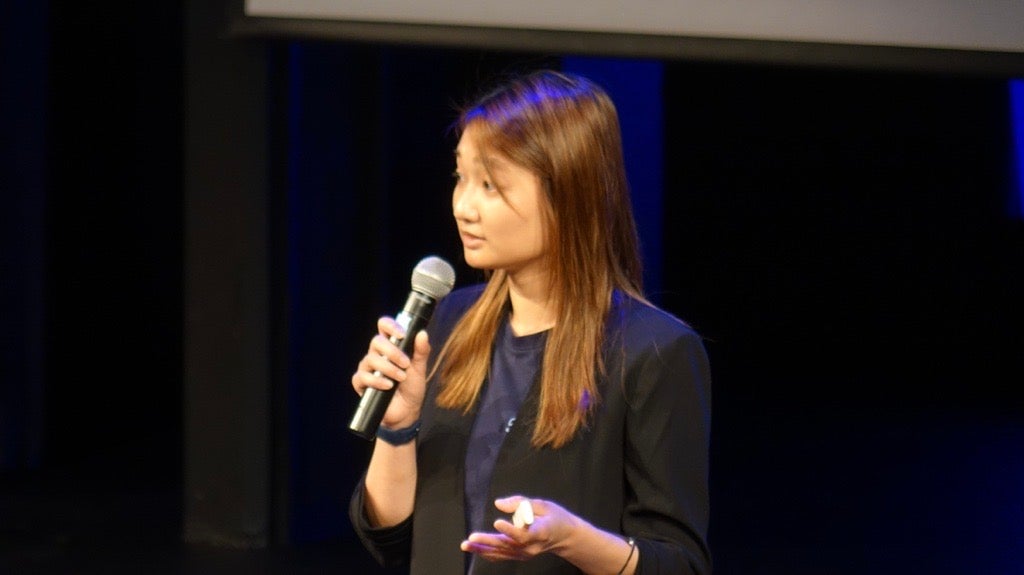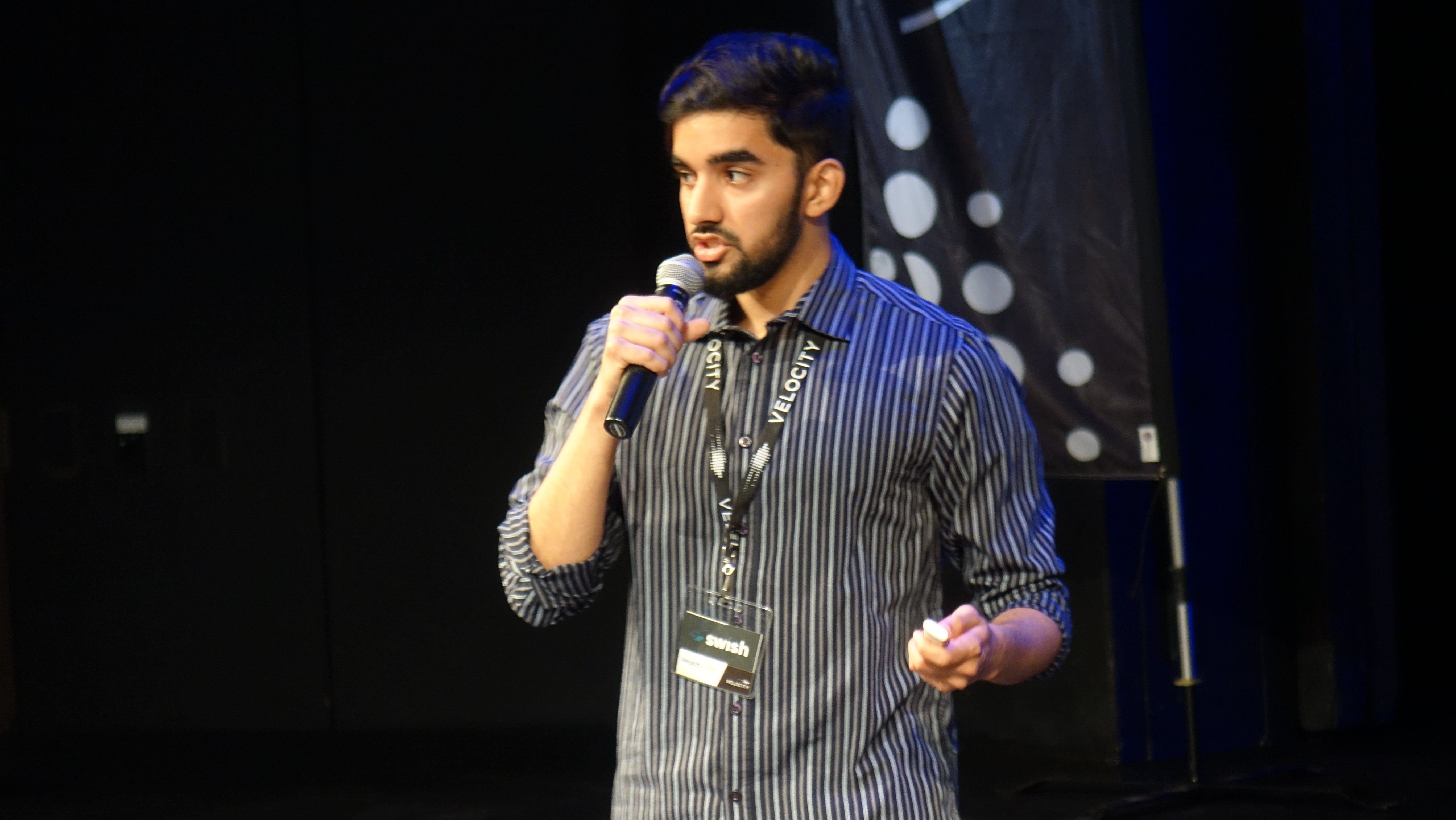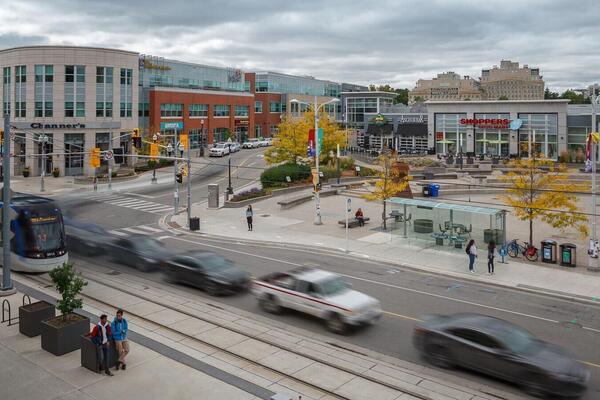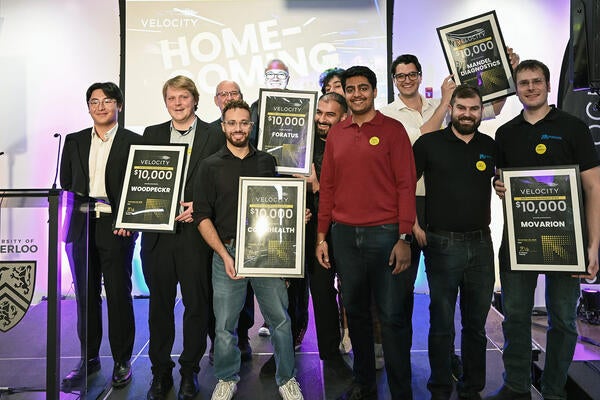
Velocity students step into the spotlight
Student teams pitch their innovative technology to secure grant funding

Student teams pitch their innovative technology to secure grant funding
By Angelica Marie Sanchez University RelationsOn July 19th, the University of Waterloo community came together to support seven finalist teams as they pitched their business ideas for a chance at one of four $5,000 grants, and one $500 grant for People’s Choice Award.
This spring term, Velocity received more than 80 applications covering a wide range of industries. Of those selected 23 semi-finalist teams, seven innovative startups — EmpathEase, Entangled Vision, EyesoBio, Nitron, Pragmatica, Quinproc and Swish — presented their business ideas in front of a panel of judges in the Theatre of the Arts, Modern Languages building.
“It was great to host the event at such an amazing venue at the Theatre of the Arts,” said John Dick, director of Velocity campus. “Every term, I am impressed by the ideas that Waterloo students are working on and the impact they could have on some massive problems. Pitching your ideas in front of an audience of strangers is no easy task and all the students were truly outstanding today."
Velocity believes anyone can do this; students just must start. It’s thrilling to see students go from zero to pitching a unique solution that has the potential to solve big problems.
Finals panel of judges
James Lowman, co-founder and CEO of Cauchy Analytics
Amber French, co-founder of Catalyst Capital Inc.
Ramneek Singh, associate of Student Venture Fund
EyesoBio is a biotechnology company which uses innovative devices for eye product testing. Its novel technology provides high level accuracy and rapid high-throughput screening of drugs, therapeutics and biomaterials.
“The current research for [eye disease] treatments are slow, expensive and relies on animal testing,” explained Kaya Wong, a post-doctoral fellow in the Department of Chemistry.
“But the difficulties of doing clinical trials have increased since COVID-19, and this year, the FDA will no longer require animal testing before clinical trials. That means in the future, we will rely more and more on cell-study to determine if the experimental eye products are safe and effective.”
This is where EyesoBio comes in. Their advanced technologies deliver a hand-size device which enables researchers to test material in the eye mimicking environments, providing standardized results on safety and effectiveness.
“The support from Velocity is going to accelerate our prototype development and help file our provisional patent, customer acquisitions and marketing,” Wong said. “We are confident that we can transform eye product testing and bring [this device] hope to the hundreds of millions suffering from eye diseases. We are EyesoBio – your one stop solution for eye product testing.”

Kaya Wong pitching for EyesoBio
Conner Kapahi of Entangled Vision, who is a PhD candidate for Physics in Quantum Information, explained how age-related macular degeneration (AMD) — the leading cause of blindness in people over the age of 60 years old — has existing treatments that can effectively slow and stop vision loss. But there are no treatments which can reverse vision loss once a patient is diagnosed with AMD.
Their solution is a technology that allows their team to create a screening test using quantum information tools to detect macular degeneration before vision loss occurs.
While as a PhD student, Kapahi developed a prototype device and conducted research trials at Waterloo’s School of Optometry and Vision Science. With the future in mind, Kapahi and his team made certain that they can upgrade the functionality of the device so clinicians can test for other diseases through software updates.
“This year, our first patent was approved, and then we submitted a second provisional patent. The $5K grant will allow us to begin the process of full clinical trials seeking FDA approval as a diagnostic device,” Kapahi said.
Through the Velocity Cornerstone program, Kapahi was able to perform extensive business development and hone the skills he needed to present Entangled Vision within a three-minute pitch.

Connor Kapahi pitching for Entangled Vision
For Karthik Prasad, a computer science graduate student, he first started developing Pragmatica as a fourth-year design capstone project. But after speaking with the director of Velocity campus, Prasad found the pitch competition to be an interesting venture that could potentially further develop Pragmatica into a startup business.
“Waterloo has such a big infrastructure for resources that you can access, and they have a really good support system for entrepreneurship,” Prasad said. “It’s been really cool to see how we have taken a lot of steps towards becoming a company from just a product.”
Prasad, along with Waterloo alum, Thomas Mastantuono (BASc ‘23), Pragmatica is developing a VR speech therapy solution for people with communicative disorders to supplement or provide as an alternative for those who cannot access or afford a dedicated speech therapist.
“There are some current alternatives to speech therapy like online video exercises or online teletherapy,” Prasad explained during his pitch at the Velocity $5K finals.
“But the video exercise is really lacking interactivity and the live teletherapy is still limited by therapist availability. This is where our solution, Pragmatica, comes in consisting of curated VR activities that mimic the kind of exercises that are done in speech therapy sessions. So, people can practice their skills without the need of a speech therapist [present].”
Prasad added that there are currently three speech therapy clinics across Ontario that have agreed to conduct paid pilots with the team. The $5K grant will support the Pragmatica team to fund the development assets, hosting fees and the VR headset to run pilot tests.

Karthik Prasad pitching for Pragmatica
One green-tech solution also made the final four. Swish’s Miswar Syed was an undergraduate student in Saudi Arabia when he heard about Waterloo’s Velocity incubator. During his research in mechatronics and robotics, he discovered a problem where solar panels would often accumulate dust, especially in the Middle East and Africa, where they have the highest usage for solar energy due to the significant amount of sunlight throughout the year.
Less than a year into his master’s program at Waterloo, Syed knew there was potential in commercializing his idea of Swish: a cost-effective product to clean solar panels in a sustainable and economical way without the use of water or expensive cleaning robots.
“As an engineer, we like to focus on the technical side and make products that have the most features,” Syed said. “One of the main things I learned during the Cornerstone program is to talk to people as much as you can. I started talking to companies and they confirmed that we are solving a real problem and so I continued working on the solution.”
But being an entrepreneur is no easy step. Syed explained that it’s very easy to lose your passion in something rather quickly. Where it’s important for students to pursue their passions and be passionate about the problems they are trying to solve.
For Syed, he felt prepared for the long working hours and the challenges that come with developing Swish. “The $5K grant will help scale our product and allow us to conduct pilot testing of our second prototype later this year.”

Miswar Syed pitching for Swish
People’s choice winner: EmpathEase
EmpathEase, a team of electrical and computer engineering graduate students, won the People’s Choice Award. Their business idea aims to connect patients with appointments instantly with culturally aligned therapists or counselors. From personal experience, the EmpathEase team wants to solve the problem that international students and immigrants experience when seeking mental health therapy without the hesitation and socio-cultural barriers.

EmpathEase receiving the $500 grant for People's Choice Award
During the pitch competition, Velocity announced a new student challenge. The week-long Innovation Challenge is in partnership with Unity, Rogers and the Bank of Montreal, where Waterloo students will get to explore virtual reality and 5G technologies and bridge the gap between traditional banking and the needs for future generations.
From September 19 to October 1, Velocity will have workshops and expert mentors focused on Unity, virtual reality and 5G technologies. Students will work in teams of five to design innovative solutions and pitch to win significant prizes. Current Waterloo students can join the waitlist for a chance to participate in the fall Innovation Challenge.

Read more
Here are the people and events behind some of this year’s most compelling Waterloo stories

Read more
It Started in Waterloo: An Astronaut's Journey into the Universe of Innovation, narrated by Chris Hadfield, highlights the University of Waterloo’s role in igniting innovation within the region and beyond.

Read more
Velocity’s $10K Momentum Grants help student builders become full-time founders
The University of Waterloo acknowledges that much of our work takes place on the traditional territory of the Neutral, Anishinaabeg, and Haudenosaunee peoples. Our main campus is situated on the Haldimand Tract, the land granted to the Six Nations that includes six miles on each side of the Grand River. Our active work toward reconciliation takes place across our campuses through research, learning, teaching, and community building, and is co-ordinated within the Office of Indigenous Relations.